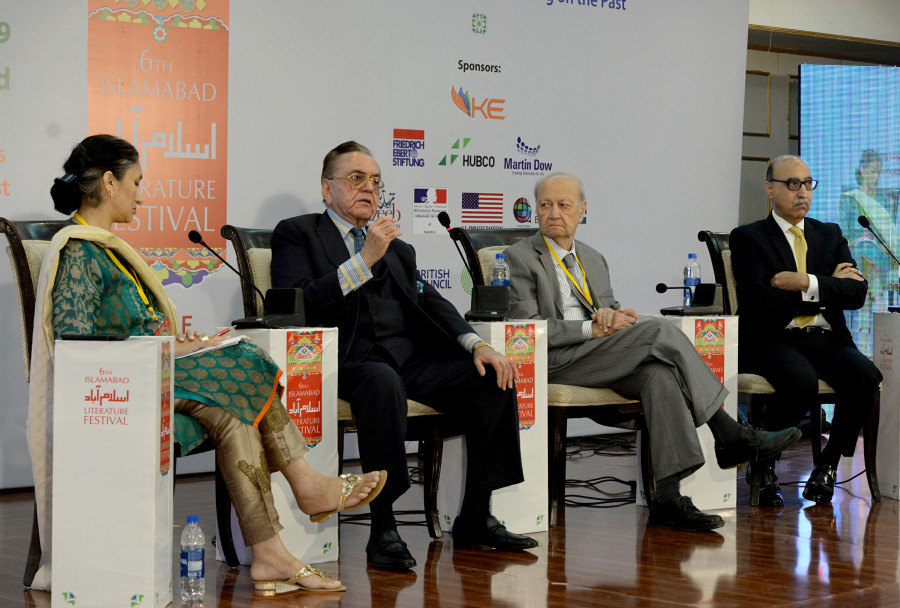Eminent economists, foreign policy experts and literary luminaries attend concluding day events
Zubair Qureshi
Eminent literary figures, writers, intellectuals and academicians hailing from Islamabad, Lahore, Karachi and rest of the country turned up on the final day of the 6th Islamabad Literature Festival (ILF) organized by the Oxford University Press (OUP) at a local hotel. They interacted with the students, youths and general public that had come to meet, see and listen to these role models in society.
Both the writers and the readers, speakers and the listeners pledged to meet again next year at the 7th Islamabad Literature Festival as it offered a unique platform to interact with one another to find solutions to their problems and promote culture of discourse and dialogue in society.
The success of the three-day long festival goes not only to the OUP Managing Director Arshad Saeed Hussain and his team but also to all those sponsors and volunteers from various universities and colleges.
Shaista Sirajuddin, noted academician and former Head of English Department University of the Punjab Lahore was such a luminary who had travelled all the way from Lahore to Islamabad to become a moderator of a session on a travelogue “The Traveller’s Tales” by Salman Rashid.
“I have come to Islamabad after almost 20 years and am very happy to be at the Islamabad Literature Festival,” said the soft-spoken distinguished professor.
It came out during the discussion on “The Traveller’s Tales” how the Pakistan government and local authorities were observing criminal silence over merciless vandalizing of some rare historical and archaeological sites in Khyber Pakhtunkhwa (KP), Balochistan and Punjab.
Another session ‘In Conversation with Julien Columeau’ also pulled a large gathering as the audience wanted to know about the enigmatic Urdu fiction writer of French origin Julien Columeau who has to his credit a number of novelettes, stories and sketches all in Urdu and Punjabi. The writer received appreciation from the audience for his knowledge of Urdu language and literature and for candid replies.
Book lovers and culture enthusiasts flocked to the Festival to learn about the literary endeavours of Pakistani authors from all parts of the country and to experience the nation’s cultural heritage from close quarters.
Earlier, the day started with a discussion on ‘Pakistan’s Foreign Policy Challenges’ with Talat Masood, Khurshid Mahmud Kasuri and Abdul Basit as speakers and Salma Malik as the moderator.
This was followed by a panel discussion on the subject, ‘Depicting Women in Literature and Drama.’ The participants were Haseena Moin, Asghar Nadeem Syed and Shahnaz Sheikh. The moderator was Maheen Usmani.
Another session was ‘Shanul Haq Haqqee ki Yaad Mein’ featuring Anwar Maqsood, Fateh Muhammad Malik, Haseena Moin, and Shayan Haqqee.
The panel discussion on Ishrat Husain’s book ‘Pakistan: The Economy of an Elitist State’ also drew interest of the audience.
A number of art enthusiasts turned up at the launch of the book ‘Radioactive Decade: An Informal Cultural History of the 1970s’. The editors of the volume Amin Gulgee and Niilofur Farrukh spoke about the book along with the art critics Aasim Akhtar, Nadia Batool and Salman Asif. Omar Shahid Hamid’s latest novel ‘The Fix’ was launched on the occasion.
The session was moderated by Nadeem Farooq Paracha.
Another important session was ‘Contemporary Pakistani English Fiction’ in which Soniah Kamal, Haroon Khalid Akhtar, Taha Kehar and Sana Munir were the speakers while Ilona Yusuf was the moderator. In a discussion titled ‘Adab Kar Is Kharabati Ka Jis Ko Josh Kehtay Hain: Josh Malihabadi’, Fateh Muhammad Malik, Saima Jaffery and Yasmeen Hameed participated as speakers and the session was moderated by Mujahid Barelvi.
A panel discussion titled ‘1919: Jallianwala Bagh and the Century that Followed’ was participated by Ali Usman Qasmi, Harris Khalique and Ali Raza. It was moderated by Aliya Iqbal-Naqvi.










